- Home
- W. Bruce Cameron
The Dog Master: A Novel of the First Dog Page 2
The Dog Master: A Novel of the First Dog Read online
Page 2
She hesitated. Her instinct was to flee, but it battled with the urge to return to the den to give birth. She padded a few feet toward the den, then halted. No. The lion was coming from that direction, coming fast.
She turned and ran for the stream, which even deep with meltwater could be forded without swimming. She lunged across, her pregnant belly slowing her down, scrabbling up the opposite bank and hearing the lion hit the water behind her. She turned and the lion was upon her.
The attack was swift and brutal. The mother-wolf ignored the pain as lion claws raked her flanks and she twisted, snapping her teeth, trying to get the lion’s throat.
Then a massive impact tumbled them both. Male-wolf had arrived and had thrown himself into the fray, slamming into the lion and seizing the feline behind its head. Yowling and growling and screaming, the two did battle.
The mother-wolf turned away and fled toward the den. She could not rejoin the fight; her only concern could be for the pups.
Her rear legs gave out when she was still two dozen yards from the mouth of the den. She crawled ahead, panting, while behind her she could hear the yelps and screams of her mate’s final moments. The lion was nearly twice the size of the male-wolf—the outcome of this bloody engagement had been foretold the moment the feline found them.
She was still struggling toward the mouth of the den when the sudden silence behind her pronounced the end of the fight. She kept her eyes on the opening where a gap between rock and ground made for the entrance, dragging her useless legs, focused on getting to safety and not looking back even when her senses told her the lion was coming after her.
* * *
The man had never been alone. Not like this, not with no prospect of seeing another human as he made his way along the rocky bluffs bordering the slender stream. No prospect of ever seeing another human, not ever again, though that seemed impossible, even ludicrous. Of course he would return to his tribe, would be allowed to return. He could not imagine anything else.
But on this day, with winter still lurking in pools of crystalline snow in deep shadows and buds barely making their long overdue appearance on the trees, he was turning his back on his people, both literally and figuratively.
Just as they had turned their backs on him.
He had tracked along the stream for most of the day, trekking into unfamiliar territory. This was land that belonged to no clan—he was safe here.
He carried a pouch sewn from reindeer hide looped over his shoulder, and carefully extracted some dried meat to chew on while he walked. His mind was on rationing, stretching his supplies as long as he could, but his stomach was focused on hunger and the easy availability of food. As a sort of compromise, he did not use the smoldering horn dangling from his neck to make fire to heat his snack, as if depriving himself of that luxury was a relevant sacrifice. The horn was packed with coals and moss and, with a few sticks and leaves added every so often, would still be potent enough to allow him to make camp before dark.
He carried both club and spear and was watching the ground for animal tracks when he heard a strange, almost ghastly, grunting and hissing. Several creatures of some kind were just ahead. He stopped, tense—hyenas? His heart was pounding—though he had never seen one, he knew he could neither successfully flee nor fight a pack of hyenas.
A shadow crossed the path and he jerked his head upward as a huge bird ghosted out of the sky and landed to a chorus of loud hisses and furious wings beating the air. Less afraid—no one had ever, to his knowledge, been killed by birds—he eased forward.
There was blood on the trail, here. Something had happened on this path, something savage and brutal, with lion tracks and wolf tracks jumbled together.
He tightened his grip on his club and, drawn by the noise, went down to the stream and stopped. A flock of immense, hideously ugly birds, with deadly beaks and featherless faces, were pecking at what he determined was a dead wolf on the opposite bank. He had never seen them before, but he supposed these were vultures. He watched their greedy plunder of the corpse for a moment, his lips twisted in repugnance.
“Yah!” the man yelled. “Away!”
The birds all but ignored him, so he stooped and picked up a rock. He hit one and the entire flock took flight, beating the air as they strained to take off.
The wolf was completely torn apart—the tracks suggested the fatal injuries had come from a cave lion, whose immense paw prints sank into the mud, but the vultures had stripped the flesh to the bone.
The man knelt, puzzling it out. It appeared that there was a vicious fight on the other side of the stream, the lion taking on the wolf. The male-wolf was eventually killed in the battle right there where he lay. Yet the blood trail was on this side of the stream. What had happened over here, away from where the vultures had been feeding?
He studied the tracks. They told a contradictory story, both lion and wolf prints seeming to go back and forth to the stream. But the blood only went in the direction away from the banks, away from the dead wolf. How was that possible?
What if he had it wrong? What if there were two wolves? Both fought the lion. The shredded carcass of one canine lay where it died, on that side of the stream, while the other one fled to this side.
But a lion probably would not attack a pair of wolves unless they were pups, and, judging by the tracks, the surviving wolf was even larger than the dead one. But something brutal had occurred here. Also, where did the wolf go when it escaped? By all appearances, it had crawled off to die.
The corpse of the wolf on the other side of the stream was too picked apart to be of any use, but if he could find the other one and it was more intact, the man decided to harvest its fur. There was great honor in wearing a wolf pelt.
He cautiously followed the blood trail, his club at the ready. A wounded wolf would attack instinctively, though judging by the blood loss he felt fairly certain the other wolf would be dead.
The track led directly to a small hole in the rock wall—a dark semicircle where the rock pulled back from the soil like an upper lip curling to reveal an open mouth. Blood was smeared on the earth in front of the hole.
The wolf was in there.
He drew in a breath, considering. If he went in with a torch held out in front of him, the wolf could not attack without getting a mouth full of flame. He could at least assess the situation, and retreat if the wolf was aggressive.
Or, if he went in with the torch, the wolf might rip it from his hand and then tear out his throat.
This was, he reminded himself sternly, why he was a man, not a boy. A man needed to meet challenges such as these. He, he needed to meet the challenge. There were those who said he would not survive the year—he would not allow himself to prove them right by failing on the very first day.
He made a torch by winding dead grasses around the end of a branch. His heart was beating strongly in his chest, and when he lit the torch from coals in his fire horn, his hands trembled.
The wolf, he reminded himself repeatedly, was probably dead.
He shoved the torch into the hole in the rock, listening for any sort of reaction, but heard nothing. He could not see much past the flames, not from outside, so he squirmed in, hating how vulnerable he was as he pushed past the lip of the cave.
Inside, it was a narrow squeeze, and he was only able to advance if he remained on hands and knees. His palms picked up a sticky liquid as he crawled: more blood.
At a very tight turn, he had to climb over some rocks, and then a shaft of light fell on his shoulders. He glanced up and saw that a crack in the rock extended all the way up to the sky, many times a man’s height and large enough in radius that had he known about it, he could have climbed down it instead of wriggling through the hole.
Starting with the crack, the cave was larger, tall enough for him to stand if he stooped, wide enough that he could not quite touch both sides with his fingers if he spread his arms.
His torch seemed weakened by the light from the shaft, bu
t just past it and the flames licked back the darkness with authority.
He saw the wolf, a female. She was lying on her side, her eyes closed. He stopped, holding his breath. Pressed up against her were three tiny pups: newborns. The mother-wolf’s side had been raked by lion claws and glistened with blood.
She was breathing, though he could not tell if the pups were also alive.
Now he understood. It had been a fight to the death by a male-wolf defending a mother-wolf ready to whelp.
He stared at the scene, his vision becoming more clear in the dancing flames from the torch head. The mother had a white spill of fur on her dark grey face, looking a little like a man’s hand. She was still motionless. If she were almost dead, the pups would never survive.
He needed meat—while he had never heard of anyone eating an adult wolf, the very young of nearly all animals could usually be made into palatable meals. He decided to take the pups and harvest the adult’s fur. There were plenty of rocks he could use to finish off the mother, though judging by the way she looked—her eyes closed, her chest barely moving—she was very near to death.
Should he wait, or pick up a rock and get it done?
Tired of stooping, he knelt in the gritty sand. It was an awkward motion for him, and he made some noise as his knees hit the ground.
The mother-wolf opened her eyes.
TWO
Alarm coursed through the mother-wolf and she growled, struggling to her feet. A human was inside her den, a human and a fire. Instincts as old as her species told her to attack this threat to her pups.
Her back legs were not cooperating so she lunged with just her forelegs, dragging herself at him, her throat full of enraged snarling.
The man smelled frightened and made a lot of noise as he scrambled backward. The fire followed him. She registered the burning thing in his hand even as he tossed it wildly away, and then the human was in the part of the den where outside air and light flowed down from the roof. She went for his legs, her teeth ready to tear into his flesh, but he was able to climb up out of reach in a shower of small stones and dust.
She looked up at him, still growling deep in her chest. He was panting, but less fear was pouring off him. He was wedged up in the rocks like a leopard in a tree. She wanted to return to her newborns, but could not as long as this menace remained.
The tiniest squeal behind her told the mother-wolf that her pups were missing her, and her teats ached at the sound. She stared at the man, wanting him to leave the den so she could take care of her young.
“Hey,” the human called softly. “Want some meat?”
The mother-wolf heard the man’s sounds and they were reminiscent of the calls from the humans who often fed her. She growled again. The smell of the still-burning fire from the front of the den was upsetting, and this human reeked of smoke as well.
When something small and light fell from the man’s hand, the mother-wolf backed away from it, then eased forward and sniffed suspiciously.
“It is reindeer. Eat it.”
The flesh was familiar, if dry and tasting strongly of smoke, but it was edible. She crunched it.
“See? It is good.”
So. This human was one of the kind who fed her. She looked him full in the face and saw the same raised eyebrows she had long ago learned meant no threat.
Nothing in her instincts would allow any animal, even a friendly one, into her den. But the lion’s attack had altered everything. She could smell the faint odor of her mate’s blood and knew intuitively that he would not be coming back. Her life’s focus now needed to be her puppies. Nothing else mattered.
Another piece of odd meat fell. She ate this one without hesitation—something beyond hunger told her to take in all the food she possibly could. Then she turned away to drag herself back to her litter.
* * *
Later, the mother-wolf registered the grunts and scrambling sounds as the man moved around. She did not know it was the sound of him climbing up the shaft, that the cascade of small stones bouncing off the rock face was from his near fall as he groped for handholds. The scent of fire remained even as the man’s smell abruptly faded from fresh to stale as the man succeeded in his ascent.
She closed her eyes, pushed away her pain, and let her young suckle at her side.
She awoke a short time later: The man was coming back, making noise as he squeezed through the entrance at ground level. She stiffened, her hackles rising, but her growl never made it past her throat. Her tolerance was learned behavior, overriding her instincts. She needed food and the man was providing. Now she smelled wet wood and, deliciously, water.
She was unhappy when the flames, which had died away, started flickering higher, shadows jumping up the walls again, but she did not move, watching the man in the steadily building light, as he crept forward with a log.
“You need water. I am going to pour it in the hollow here, in the stones. See?”
The mother-wolf registered the man sounds and then the enticing spill of water from the branch he was holding as he pointed it down. A small pool of water formed, close to her head, and her young made tiny peeps as she pulled herself forward with her two front legs, leaving them behind.
The man backed away abruptly, then cautiously returned when the mother-wolf lapped at the water.
“I will take the hollow log back to the stream for more.”
The mother-wolf returned to her young, lying down with a groan. The pain in her flanks bit hard when she moved, though it dulled if she lay still. She licked her pups carefully before falling back to sleep.
* * *
The light building and waning as it filtered down the shaft, and the noises and smells coming in on the air currents, gave the mother-wolf the sense of days passing. During the daytime, the man was often absent for long stretches, but as night fell he would build a fire at the bottom of the crevice and remain until sunrise. She could not directly see him: a large pile of loose rock separated the den from the rest of the cave, but he was detectable by his scent. In the morning he would climb over the mound of rocks and toss her small pieces of the odd dry meat. He came very close to her, and she could eat without having to rise fully off the cave floor.
Then one morning he broke the pattern. He left and did not return. The mother-wolf had grown accustomed to regular, small feedings, and though her food cravings increased daily, these consistent meals staved off the worst of her hollow, empty pains. This day, though, her hunger and anxiety rose within her mercilessly. She had to have food or her pups would perish. Normally, her mate would bring her food, regurgitating for her and, when they were old enough, her young. Now, though, the man had taken on that role.
And he was gone.
The fear was a motivator even stronger than starvation, and the mother-wolf whined. She would have to leave her young and go hunt.
She did not contemplate the impracticality of her decision. Even as she moved, dropping her pups from her teats and dragging her useless rear legs, there was no understanding that there was nothing she could possibly pursue in her wounded condition. She was driven by maternal imperative.
She had made it no farther than the base of the shaft, which stank from the pile of burned wood marking the now cold fire of the man, when a sudden riot of smells came to her nose. It was him, the man, and something else—a fresh kill.
When the man appeared, crawling, and saw her standing in the dwindling light from the shaft, he made a loud, frightened noise, startling her. She growled reflexively, feeling vulnerable, and the two of them froze, facing each other, tense.
“I have brought you fresh meat. Reindeer.”
There was a tremor in the man’s sounds and he still smelled strongly of fear, but the mother-wolf felt herself relaxing. This was familiar to her: a man, afraid but determined, bringing food.
She associated being fed with the den, so she turned and, as quickly as she could manage, pulled herself back over the pile of rocks. It felt good to be by her young, wh
o registered her return with small squeaks. She waited expectantly.
Before he came, the man lit a fire. And then he crawled over the rocks and came to her, extending a bone with a knot of meat clinging to it. Mouth watering, the mother-wolf took the food from his hand.
“I wish I could tell you I took down the reindeer myself, but I have thus far not been successful hunting on my own,” the man said.
The wolf crunched down on the bone with her powerful jaws.
“Where is your pack? I do not understand why you are here by yourself, though I do not know very much about what happens when a wolf gives birth. I have never seen any animal with newborn young. Perhaps it is your way, that the mating pair goes off by themselves. I would be very unhappy if a pack of wolves was here to greet me when I came back. I think from this point forward I will come down the shaft, just to avoid such an encounter.”
This, too, was familiar to the mother-wolf. The humans who fed her often made their low, monotonous sounds while she ate.
“And I do not understand why you just accepted food from my hand.” The man’s sounds were softer now. “No wolf has ever done such a thing, to my knowledge—I would have been told of it. Is it because of the wounds you have suffered?
“And do you wonder about me? Who I am, and why I am sharing a cave with you, a wolf, instead of with my own people? How this came to be?”
The man drew in a great breath, exhaling it in a loud, mournful sigh.
“For now, we both are alive. But no lone person can survive the winter, though that is what will eventually be upon me: a winter on my own, in this place. Until I starve.”
He sighed again.
“I do not even know what I am to do about you. You may die soon—your wounds do not appear to be festering, but clearly something inside you is broken and your rear legs cannot function. I have never eaten wolf meat. And your young—what will happen if I let them live?”
When the mother-wolf had consumed the bone, she felt sated. She put her head down.

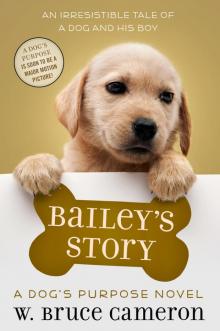 Bailey's Story: A Dog's Purpose Novel
Bailey's Story: A Dog's Purpose Novel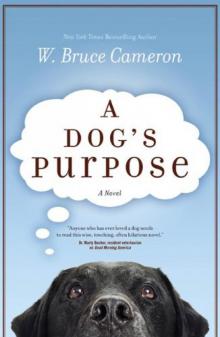 A Dog's Purpose
A Dog's Purpose Ellie's Story
Ellie's Story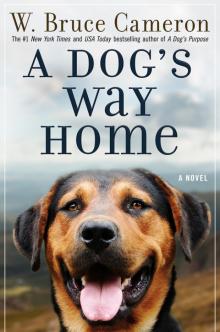 A Dog's Way Home
A Dog's Way Home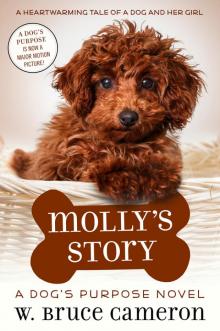 Molly's Story
Molly's Story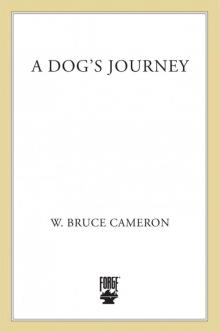 A Dog's Journey
A Dog's Journey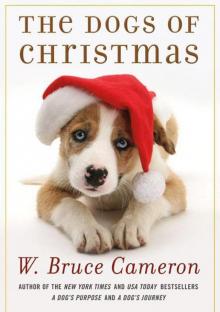 The Dogs of Christmas
The Dogs of Christmas A Dog's Perfect Christmas
A Dog's Perfect Christmas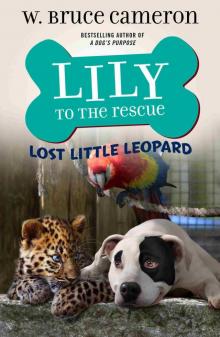 Lily to the Rescue: Lost Little Leopard
Lily to the Rescue: Lost Little Leopard Bella's Story
Bella's Story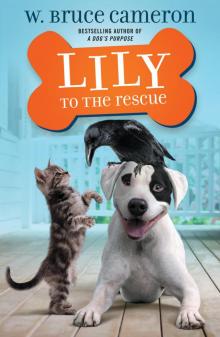 Lily to the Rescue
Lily to the Rescue Lily to the Rescue: The Not-So-Stinky Skunk
Lily to the Rescue: The Not-So-Stinky Skunk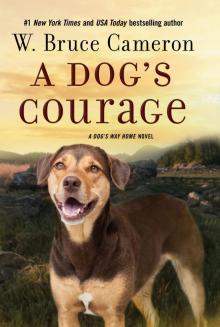 A Dog's Courage--A Dog's Way Home Novel
A Dog's Courage--A Dog's Way Home Novel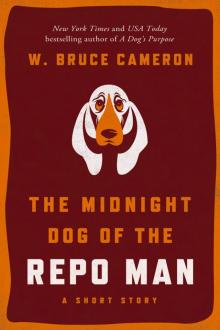 The Midnight Dog of the Repo Man
The Midnight Dog of the Repo Man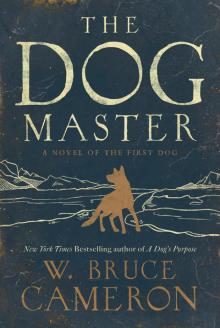 The Dog Master: A Novel of the First Dog
The Dog Master: A Novel of the First Dog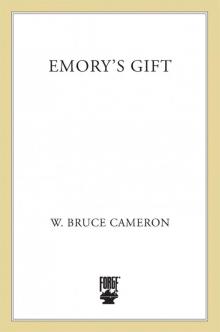 Emory's Gift
Emory's Gift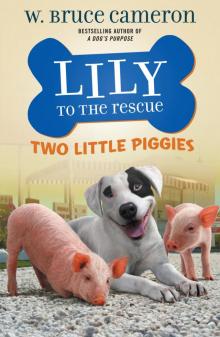 Lily to the Rescue: Two Little Piggies
Lily to the Rescue: Two Little Piggies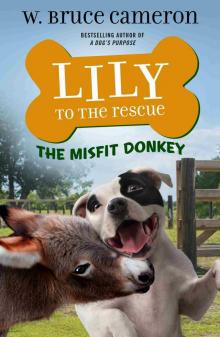 Lily to the Rescue: The Misfit Donkey
Lily to the Rescue: The Misfit Donkey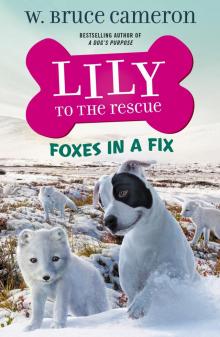 Lily to the Rescue: Foxes in a Fix
Lily to the Rescue: Foxes in a Fix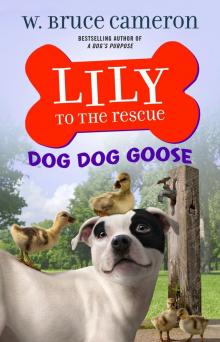 Lily to the Rescue: Dog Dog Goose
Lily to the Rescue: Dog Dog Goose Max's Story
Max's Story A Dog's Purpose Boxed Set
A Dog's Purpose Boxed Set Toby's Story
Toby's Story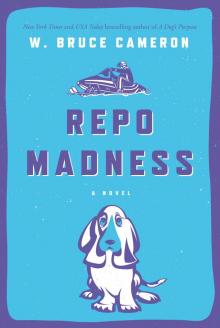 Repo Madness
Repo Madness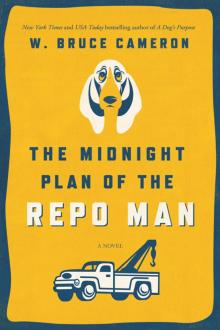 The Midnight Plan of the Repo Man
The Midnight Plan of the Repo Man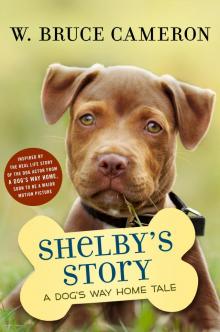 Shelby's Story
Shelby's Story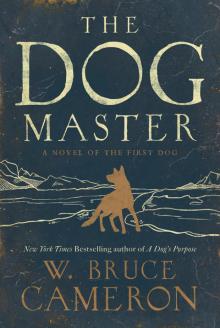 The Dog Master
The Dog Master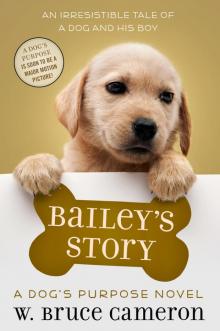 Bailey's Story
Bailey's Story